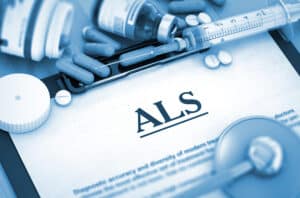Amyotrophic lateral sclerosis, better known as ALS, is a complex illness that can affect adults as young as 40 and can even occur later in life, in someone’s 60s and 70s. It’s a debilitating illness that currently has no cure. An early diagnosis can get your senior earlier interventions that may help to slow the progression of ALS.
ALS is a Nervous System Disease
ALS is a progressive illness that affects nerve cells throughout the spinal cord and the brain. Gradually the nerve cells are unable to control muscles and voluntary movements, which results in a frustrating loss of abilities as motor neurons deteriorate. The symptoms of ALS might be easy to overlook at first, so it helps to know what those are. A senior care provider can help keep an eye out for symptoms of various health conditions, like ALS.
Early Symptoms

Pain typically isn’t a factor in ALS at any stage, so it’s important to notice other signs. ALS impacts voluntary movements, but at first the situation is a little different. The very earliest signs can include weakness in a limb and involuntary muscle twitches. Some people also experience slurred speech. Typically, people start to experience ALS symptoms once they’re over the age of 40.
As the Condition Progresses
As ALS gets worse, people who have it may experience a variety of symptoms such as:
- Trouble with mobility
- Increasingly slurred speech
- Trouble swallowing
- Muscle cramping and twitching
- Increased likelihood of falling
- Cognitive changes
The disease continues to worsen until voluntary movement is not possible at all. People with ALS may eventually lose the ability to talk, to eat, and even to breathe. In later stages, people with ALS need to have breathing assistance in order to continue breathing. Respiratory failure is often the final cause of death.
ALS Awareness Month
ALS Awareness Month is celebrated every May since 1992. The purpose of ALS Awareness Month is to educate people about what ALS means and how it impacts people who have it. As of now there is no cure for ALS. It’s more likely that men will develop ALS, but women do also develop it. ALS is hereditary, although there may be environmental factors, too, like toxin exposure and smoking. If your senior is experiencing symptoms of ALS, there are tests her doctor can run to confirm what she’s facing.
People with ALS, and the family members who care for them, need a great deal of help. Senior care providers can make life easier for everyone involved and assist your senior while helping her to maintain her dignity.


